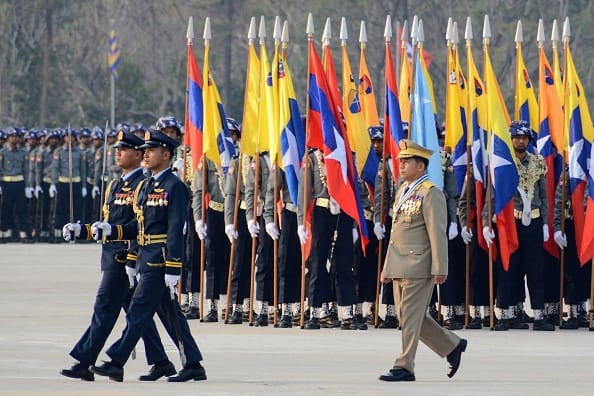17.12.2024
Burma: Are the US sanctions really back ?
Interview
19 juillet 2019

Engaged in an improbable game of lying poker, bilateral « summits » and impromptu visit[1] with the twisted North Korean dictatorship, a highly motivated linchpin[2] of the preliminary peace talks – relocated to Qatar… – with the radical Afghan Taliban insurgency, leading an economic and accounting guerrilla warfare with a worrying volume with the Chinese strategic rival, the Trump administration does not forget to devote some attention, sixteen months before the next election (presidential elections on 3 November 2020), to another tormented Asian theatre about which the 45th tenant of the White House hopes to stand out from the action of its predecessor: the Burma of Aung San Suu Kyi, of omnipotent and irritable generals officially withdrawn from political affairs… while still so present, where has been going on for almost a decade, at a frustrated pace, a very laborious transition to democracy.
On Tuesday, July 16, through the voice of Secretary of State Mike Pompeo, the US State Department announced « administrative » sanctions against the Commander-in-Chief of the Burmese armies, Senior General Min Aung Hlaing, and three generals for their responsibility in the violence perpetrated by the army since the summer of 2017 and the controversial insurgent operation in Arakan (western part of the country) against the Rohingya community. As of mid-July, the four senior Burmese officers concerned (and their families) are now prohibited from entering the United States of America. An announcement that did not really shake the almighty caste of Burmese generals, very comfortable and serene, entrenched in its austere citadel of Naypyidaw… Nor did it rekindle too high the flame of hope in the camp of supporters of a more successful democratic transition…
It should be noted that a year earlier, on 17 August 2018, the US Treasury Department had already applied sanctions against a quartet of Burmese military officials involved in the « ethnic cleansing » of the Rohingya in Arakan[3]… In other times, two years earlier, in the summer of 2016, when a more enlightened and personally committed[4] Democratic Chief Executive resided in the White House, the American administration was easing the range of economic sanctions[5] applied to the Burmese regime over the past two decades.
« We remain concerned that the Burmese government has not taken any action to punish those responsible for human rights violations and abuses (in Arakan), » says the US chief of diplomacy, Mr. Pompeo, three years later. In fact, the administrative sanctions announced on 16 July 2019 are both political and symbolic, as the military officials targeted are not known regular visitors to the United States; their company has not been particularly sought after in recent decades on the American East Coast…
On the other hand, while relations between the Burmese authorities (civilian and military) and the US administration (mainly with Western democracies, the UN and the EU) have deteriorated considerably since the summer of 2017 – in the wake of the questionable management of the Rohingya case in Arakan (Rakhine state) – the vexation imposed on the proud Burmese military institution and its (very) influential army leader will not reduce the gap between Naypyidaw and Washington, quite the contrary.
For its part, the Chinese neighbour and partner will consider the Trump administration’s decision in a different light, directly benefiting its interests…
Approved since the summer of 2017 by part of the public opinion, civil society, a cohort of international institutions (United Nations, European Union), human rights NGOs and a growing number of congressional parliamentarians, the Trump administration’s stiffening of the Burmese military leadership is not strictly speaking a surprise; the fact that the powerful army commander Min Aung Hlaing is specifically sanctioned by the US authorities is anything but insignificant, even if the scope of the measure remains very relative and more or less painless for the individuals concerned.
It should be noted that the civilian government of the National League for Democracy (NLD) of the emblematic Aung San Suu Kyi, who has presided – to a certain extent[6] – since April 2016 over the destiny of this South-East Asian country, long in the hands of an inflexible military junta (1962-2010), has so far escaped, despite a concert of criticism and stigmatization (particularly in the West) maintained since the summer of 2017 (crisis in Arakan[7]), at this homoeopathic return of US sanctions.
With one year to go before the next Burmese national election (general elections in autumn 2020), the former passionaria of the Burmese democratic cause, whose personal aura and credit are now significantly eroded (particularly in the capitals of the great Western democracies), cannot naturally complain about it…
Unless, as feared by part of the Burmese business community, various Western investors already burnt out by the erratic course of events observed in recent years, the State Department’s decision of 16 July is the prelude to a more severe and extensive future logic of sanctions against the Burmese regime and its various competing power poles…
—————————–
[1] Meeting of D. Trump and Kim Jong-un on June 30 in Panmunjom, in the demilitarized zone separating the two Koreas.
[2] In June, Secretary of State Pompeo suggested that a peace agreement to end the Afghan conflict could be reached before 1 September 2019…
[3] ‘’U.S. sanctions Myanmar military commanders and units for their role in ‘ethnic cleansing’, The Washington Post, August 18, 2018.
[4] President B. Obama has visited Burma twice (2014 and 2016).
[5] Which ‘warned’ US companies and foreign investors using US financial services to do business with about 100 Burmese entrepreneurs linked to the former military junta.
[6] Insofar as the Constitution in force (2008) grants the army considerable prerogatives (see 1/4 of the seats in all assemblies reserved for the military, without a vote; the head of the army does not report to the government and personally appoints the ministers of defence, interior, border affairs.)
[7] 700,000 Rohingya refugees in makeshift camps in Bangladesh’s Cox’s Bazaar region.